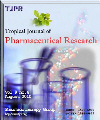
|
Tropical Journal of Pharmaceutical Research
Pharmacotherapy Group, Faculty of Pharmacy, University of Benin, Benin City, Nigeria
ISSN: 1596-5996
EISSN: 1596-5996
Vol. 15, No. 12, 2016, pp. 2595-2602
|
 Bioline Code: pr16341
Bioline Code: pr16341
Full paper language: English
Document type: Research Article
Document available free of charge
|
|
|
Tropical Journal of Pharmaceutical Research, Vol. 15, No. 12, 2016, pp. 2595-2602
| en |
Ehrlich ascites tumor-bearing mice treated with aqueous ethanol plant extract from Euphorbia tirucalli  showed signs of systemic toxicity showed signs of systemic toxicity
Kviecinski, Maicon R; Santos, Júlia R dos; Magagnin, Bruna G; Correa, Marina R; Clarinda, Morgana M; Trabold, Luciana A; David, Isabela MB; Fernandes, Flávia S; Silva, Jane da; Kanis, Luiz A; Parisotto, Eduardo B; Castro, Luiza SEW; Silva, Fabiana O da & Pedrosa, Rozangela C
Abstract
Purpose: To evaluate the antitumor effect of a latex extract from Euphorbia tirucalli Linn.
(Euphorbiaceae) and its toxicity.
Methods: Aqueous ethanol and petroleum ether extracts were obtained through maceration. .Maximum
tolerated dose was determined in healthy mice. Antitumor activity was measured in Ehrlich ascites
tumor-bearing mice treated with the extract through intraperitoneal injection (62.5, 125 or 250 mg/kg)
every 48 h (four doses). Efficacy was assessed by weight gain, abdominal circumference, volume of
ascitic fluid and packed tumor cells, tumor cell viability and survival. Toxicity indicators were serum
glucose, triglycerides, total proteins, activity of alanine and aspartate aminotransferases and mass of
heart, spleen, kidney and liver. A hemolysis assay was also performed.
Results: Doses of 62.5 and 125 mg/kg caused no antitumor activity, while 250 mg/kg dose reduced
weight gain (3-fold), abdominal circumference and volume of ascitic fluid (> 50 %) and packed cells (50
%), but lowered tumor cell viability (40 %). However, mice treated with the extract survived for a shorter
time than control mice. Furthermore, the 250 mg/kg dose caused cardiac atrophy, splenomegaly and
fasting hyperglycemia. The extract caused hemolysis, and the half-maximal effective concentration
(EC50) was 1.6 (0.9 – 2.7) mg/mL.
Conclusion: Euphorbia tirucalli extract inhibits Ehrlich ascites tumor in mice, but the therapeutic dose is
also harmful to non-tumor tissues.
Keywords
Euphorbia tirucalli; Ehrlich ascites tumor-bearing mice; Antitumor; Toxicity; Cardiac atrophy; Splenomegaly
|
| |
© Copyright 2016 - Pharmacotherapy Group, Faculty of Pharmacy, University of Benin, Benin City, 300001 Nigeria.
Alternative site location: http://www.tjpr.org
|
|
